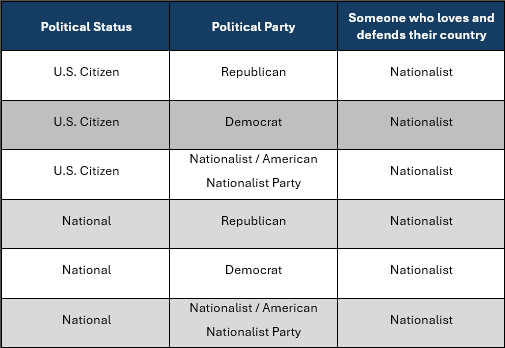National vs. Nationalist
There is an increasing number of news stories related to the term nationalist. I’ve noticed that the media gives it a bad or negative connotation and seems to imply it relates to anti-government activities or in being “anti-American” or “unpatriotic”.
I realized that this publicity related to the term nationalist could negatively impact the movement of those Americans looking to correct or declare their political status to a national.
I thought this would be a good opportunity to share with you my understanding of the difference between a national and nationalist so that you can make an informed decision to gain your national status and to help educate others.
national
A person who owes permanent allegiance to a state or country. A national is defined as “a person owing permanent allegiance to a state.”
Section 101(a)(21) of the Immigration and Nationality Act (INA)
The short answer to the question is that an individual can be both a national and a nationalist at the same time, but these two terms are different.
A national is a political status and a nationalist is a political party affiliation. So, an individual can be either a U.S. Citizen, or they could be a national, which are political statuses.
On the other hand, an individual could be either a Republican, a Democrat or a Nationalist which are political party affiliations. There are other political statuses and political parties, but for this example I just used some that most are familiar with.
nationalist
From WordNet 3.0 Copyright 2006 by Princeton University
- one who loves and defends his or her country
- an advocate of national independence of or a strong national government
So, in this example it will illustrate that there are variations or combinations of a political status with a political party affiliation of which an individual could define themselves. Here are some examples in a simple chart that might help clarify this.

Unfortunately, there are many folks that are employed in relevant government agencies that don’t understand the difference between a political status and a political party.
Let me share with you a real-life experience that I had that illustrates exactly this gap in understanding. It will illustrate that, even within a government agency that should have a vested interest in this information and should know the difference between these classifications, there are those that do not understand this important distinction.
About six months ago I approached the local voter registration office in my county to discuss updating my voter registration from a U.S. Citizen to a National. My expectation was that it would be denied because I had recently declared my political status as a National and was no longer a U.S. Citizen. *
In my discussions with the county voter registration supervisor, I quickly realized that she had no idea what a national was, and in fact, thought I was wanting to change my political party affiliation. The point being that she and her staff, in their capacity related to voting, should have had a full understanding of the difference between a political status and a political party affiliation.
In their defense, as with most Americans, we’ve been indoctrinated to think there is only one political status to aspire to be, that is a U.S. Citizen. We’re not educated with all the facts about the choices we have as it applies to our political status. We can chose our political status, we don’t have to ask permission as to what it should be.
It is my opinion that a national is not the same as a nationalist. One is a title that describes a political status, the other is a title that describes a specific political party affiliation or describes one who loves and defends his or her country. It is critical, in my opinion, to specify and understand the difference between a political status and a political party affiliation.
Don’t assume others will understand the difference or the definitions of these titles. This lack of understanding may lead them in the direction the media will take them and influence their perception of you. Your lack of understanding of the difference between these terms could mean the difference in your decision to be truly free as a national.
Remember, the greatest strength and responsibility that we have in this movement is to educate ourselves and to help others do the same. Just as important is your political status. Whether you’re a U.S. Citizen or a National, helps define who you are and guides your perspective as a patriotic American.
This is just one man’s opinion. What’s yours? Leave a comment below.
Your confrere national, David
* After explaining to election supervisor that I was no longer a U.S. Citizen, regardless of whether she knew what a National was, she indicated that only a U.S. Citizen could vote in federal elections. The discussion went so far as to the topic that voting was a privilege reserved only for U.S. Citizens. Whereas I commented to her that it should not be a privilege reserved for just one political status, but for all “American” citizens, including a National (which is an acknowledge political status). Click here for the full story regarding registering as a voter as a National.



You are correct a nationalist is someone who participates in nationalism – and I think the intent, when the term is used by the media and political adversaries, is to equivocate in the public mind the terms national, nationalism, nationalist and ultimately national socialism as a way to vilify our citizenship movement to make us out to be some sort of radical Nazis. It’s a political warfare term and I immediately correct anyone that calls me as a national a “nationalist”.
I think that’s very interesting, more brainwashing by the media. They’re applying their own connotation of a word to change the perception to negative. When it’s not negative at all.